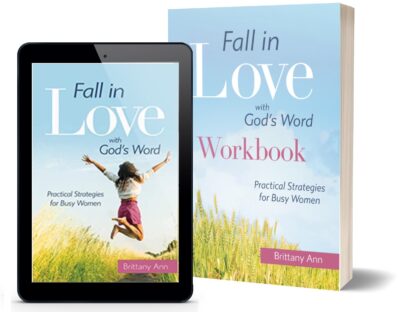 With a book as popular and widely-read as the Bible, it’s completely normal and natural that not everyone who reads the Bible would approach it the same way.
With a book as popular and widely-read as the Bible, it’s completely normal and natural that not everyone who reads the Bible would approach it the same way.
Some Christians read Scripture to learn facts and information, others read God’s Word to receive wisdom and encouragement, and still others read God’s Word to find practical tips and advice they can apply to their lives today.
This is great!
I love that the Bible offers us so much, and that in can impact all of our lives in such different ways.
Yet, we must be careful not to focus solely on one aspect of Scripture, neglecting everything else the Bible offers us and skewing our perspective in the process.
Otherwise, we are likely to end up believing one or more biblical misconceptions, and these misconceptions about the Bible can REALLY prevent us from reading, understanding, and enjoying God’s Word!
*This post contains affiliate links, which means if you make a purchase, I may make a small commission at no additional cost to you. This helps cover the many costs of running this site and allows me to help provide for my growing family. Thank you!
The Danger of Biblical Misconceptions
While holding a few misconceptions about the Bible may not always be dangerous, unfortunately, these biblical misconceptions really can prevent us from enjoying God’s Word if left unchecked.
Here’s an excerpt from chapter two of my book, Fall in Love with God’s Word: Practical Strategies for Busy Women, that explains this well:
And yet, isn’t this the same approach many of us take with God’s Word?
We get so caught up in our own perspective that we completely forget to consider God’s perspective. We’re so busy looking for the information, insight, and encouragement we want to receive that we completely neglect to pause and ask God what information, insight, and encouragement He wants us to share.
Of course, there’s nothing wrong with looking up a particular fact or an encouraging verse when we need one. But we must be careful not to forfeit the honor and privilege of sacred communion with God Himself for nothing more than a passive, one-way exchange of information.
But all too often, that’s exactly what we do.
We trade the fullness of God’s Word for our own limited interpretation of it, and we wonder why it’s weak and ineffective in our lives. We content ourselves with a meager portion of truth and encouragement, and we wonder why nothing changes.
Or even worse, we fail to read the Bible at all, and we wonder why we’re still stuck dealing with the same hurts, hang-ups, sins, and struggles year after year.
The problem isn’t the Bible’s lack of power or relevance in our lives. God’s Word is every bit as powerful today as it’s always been. The problem is we aren’t accessing this power. We’ve gotten so comfortable in our current routines that we don’t even realize the Bible offers us so much more.
Friend, it’s time to stop settling for a life of hurts, hang-ups, sin, and struggle, thinking that’s all God has for us. It’s time to replace our skewed perspective of the Bible with a more complete and accurate perspective so we can finally experience the life-changing power of God’s Word for ourselves.”
You can learn more about my book, Fall in Love with God’s Word: Practical Strategies for Busy Women, here.
Five Common Misconceptions About the Bible
In Fall in Love with God’s Word: Practical Strategies for Busy Women, I share five common, yet incorrect, misconceptions about the Bible many Christian women have, often without realizing it.
These biblical misconceptions are:
- The Storybook Bible Perspective
- The Rule Book Bible Perspective
- The Instruction Manual Bible Perspective
- The Coffee Table Book Bible Perspective
- The Personal Biography Bible Perspective
Let’s look at each of these common misconceptions about the Bible a bit more in-depth.
1. The Storybook Bible Perspective
The Storybook Bible Perspective is a common misconception about the Bible that views God’s Word primarily as a children’s storybook, designed to interest or entertain.
While it is true that the Word does contain stories (many of which are VERY entertaining!), the Bible–as a whole–is not primarily a story book. And if we are only reading the Bible as something to interest or entertain us, we aren’t going to be very motivated to read it.
Instead, we need to dive deeper into the stories to uncover their meaning.
- What does this passage teach us about God and His character?
- What does this passage teach us about our spiritual ancestors and the choices they made?
- What wisdom or advice does this passage have for me to apply to my life today?
- What lessons can these stories teach me?
These are all great questions to ask no matter which of these five common misconceptions about the Bible you’re trying to avoid.
2. The Rule Book Bible Perspective
The Rule Book Bible Perspective is a common biblical misconception that views God’s Word primarily as a huge collection of outdated rules designed to ruin our fun.
And if you’re still viewing Scripture as just a collection of rules — of course you’re not going to be motivated to read it!
Yet, again, the Bible is so much more than just a long list of rules and regulations. It has so much wisdom, insight, encouragement, advice, perspective, and even humor for us as we read its words and apply them to our lives. The Bible is how we get to know God, and one of the primary ways He speaks to us today.
Yes, the Bible does give us rules and guidelines, but it gives us so much more than that!
3. The Instruction Manual Bible Perspective
The Instruction Manual Bible Perspective is a common misconception about the Bible that views God’s Word primarily as a “how-to guide” full of clear-cut, step-by-step answers to any situation or predicament we could possibly face.
Personally, I was first introduced to this idea in high school, with the acronym: Basic Instructions Before Leaving Earth (B.I.B.L.E.). While this acronym is super catchy, unfortunately, it’s not really correct.
You see, the Bible is not a how-to guide, an owner’s manual or a set of instructions. There’s no table of contents where you can look up important issues like “How do I respond to an adult child caught in sin?” “How should I dress for church?” or “Should Christians participate in Halloween?” and then just flip to the page to get your answer, all laid out on the page in step-by-step format. This is one of the most common misconceptions about the Bible.
Yes, Scripture does give us wisdom and guidance, but often in a more roundabout way. It doesn’t simply lay out what we need to do, with step-by-step instructions. We need to read the stories and commands, absorb the lessons, and (often) figure out exactly how they apply to us today. It’s a bit more complicated than an instruction manual.
4. The Coffee Table Book Bible Perspective
The Coffee Table Book Bible Perspective is a common biblical misconception that views God’s Word primarily as a beautiful collection of short, inspiring quotes we can read or memorize whenever we’re feeling sad, lonely, or need a little extra motivation.
Yet, again, this misconceptions about the Bible would be a gross simplification. While Scripture does contain numerous quotables, it can be irresponsible to simply cherry-pick verses out of context to prove our point or convey a message. Many of those verses either don’t apply to us directly, or they don’t apply the way they hope they might.
And when we only read the most beautiful or inspiring verses from the Bible, we miss out on the stern warnings against sin that we desperately need, along with the beauty of what God has done for us in comparison to where we’d be without Him.
5. The Personal Autobiography Bible Perspective
The Personal Autobiography Bible Perspective is a common misconception about the Bible that views God’s Word as a book primarily about YOU.
Yes, the Bible does contain a wealth of insight and information for you, but it’s not primarily about you. The Bible is a book about God and His plan for grace and redemption for all mankind.
So yes, please do ask questions like, “What does this passage mean for my life?” and “What should I do in response to this passage?” but don’t stop there. Also ask yourself questions like, “What does this passage teach me about God and what He values?”
Asking yourself questions like these will help you avoid the most common misconceptions about the Bible as you learn to read it with a more well-rounded perspective.
Reading the Bible Can Be Fun and Enjoyable!
 By the way, if you’re interested in learning to read the Bible more consistently, get more out of it, and truly enjoy your time in God’s Word, I’d love to invite you to check out my brand new book: Fall in Love with God’s Word: Practical Strategies for Busy Women!
By the way, if you’re interested in learning to read the Bible more consistently, get more out of it, and truly enjoy your time in God’s Word, I’d love to invite you to check out my brand new book: Fall in Love with God’s Word: Practical Strategies for Busy Women!
Practical, encouraging, and full of biblical truth, Fall in Love with God’s Word has everything you need to learn how to:
- Overcome 7 common obstacles preventing you from spending time in Scripture
- Discover the personalized Bible-reading routine that works for YOU
- Learn 15 easy ways to make reading the Bible more meaningful and enjoyable
- Use Scripture to conquer sin, false beliefs, and negative thought patterns
- Experience fresh spiritual growth and passion for God’s Word.
Please visit Amazon.com or your local bookstore to learn more and grab your copy of Fall in Love with God’s Word (and its companion workbook) today!
Additional Resources for Better Bible Study
Here at Equipping Godly Women, I have a TON of resources to help you learn how to read the Bible, avoid the most common misconceptions about the Bible, and truly enjoy your time in Scripture.
Here are a few additional posts you may enjoy:
How to Read the Bible (Easy Instructions for Beginners!)
How to Read the Bible Daily (And Make it a Habit)
Do You Truly Enjoy Reading the Bible? You Can!
How to Study the Bible for Yourself (Easy Beginner Method)
How to Stop Getting So Distracted During Prayer and Bible Study
Struggling to Read the Bible Consistently? Here are 7 Reasons Why
Create Your Own Bible Study Basket
10 Best Bible Studies for Women to Help You Grow in Faith
What to Look for In a Women’s Bible Study
7 Best Bible Study Apps for Christian Women — All Free!
Are you guilty of believing these misconceptions about the Bible? What other biblical misconceptions drive you nuts?
Brittany Ann is an ECPA bestselling author and founder of Equipping Godly Women and Monetize My Ministry. She’s also a Christian speaker, podcaster, and conference host. Her work has been featured on numerous TV, radio, and online ministries, including CBN, MSN, Christianity Today, Evangelical Alliance, Patheos, Crosswalk, and more.




Oh, wow! I am so glad I found your blog through EBA. I can tell I am going to love it! You speak boldly yet lovingly. I am excited to read more!
Thanks, Christina! I’m glad you found us!
I thought many of these points very good Britany! But because I am a Sola Scriptura girl I would disagree with the way you explained a few things 🙂 I am thankful you are discussing these scriptural issues. Brittany, they are so very important to think about and decide for ourselves. I also think many Christians have never thought about these issues and I for one am so thankful you are writing about these thought provoking issues! You go girl! You have my prayers and support!
Aww thanks! Did you read my article on sola scriptura? (I’d link it but my computer is in the shop and mobile only is a serious pain!) Anyways, I used to believe it too, but once I researched I found that not only is there no Biblical basis for it, but logically, there’s some big holes in it. The article explains more 🙂
I’m sorry, we are all entitled to our opinions, and that is what I believe is one of the biggest purposes of the Bible, not always understanding the how and why, but having blind faith in He who wrote it.
I use the bible’s teaching to deal with my son who has serious defiance issues. And for other relationships. How did Jesus deal with those? With compassion and love. I went from serious regret, depression, loss, and anger over my less than perfect circumstances, but when I realized that I am to follow Jesus’ lead, my heart filled with compassion and understanding, and our family life changed drastically. Jesus taught me that. Not a therapist or psychologist. It’s a work in progress, but I believe Paul’s message to focus on what is good, that we have not yet finished the race, and to press forward looking ahead and growing, not getting stuck in what is behind.
The Bible is God’s love letter to us. Jesus said “remain in me” and John explicitly details Jesus as the word made flesh. To bear good fruit, and you will know them by their fruit, we must remain in the Word (Jesus) and if that’s not personal then I don’t know what is. And the book of Romans? I know Paul is addressing the Romans at the time, but the message is transcendent. It is written for every one of us, to persevere, to lean on the Holy Spirit, to know that the power of being alive in Christ by partaking in his death, is the only way to fight the battle between fleshly temptations that lead to sin and death. Is that message not for us?
And it is the story of all mankind. From the fall, through redemption, and ultimately salvation. How is that not about us? Christians are his chosen people. I am part of his chosen people. You cannot reduce the bible to a history book. To do so is so irreverent and ignorant.
I agree, many take things out of context, but that’s why studying the bible, in context is important. If the only scripture anyone ever reads is a pretty wall hanging from Hobby Lobby, then they are not getting the full picture.
God shows his love for his people time and time again. He shows how no matter how far his people stray, if we call upon his name humbly and trust in him that what we cannot accomplish spiritually in our own strength, he will not forsake us. How is that not personal?
God was not just addressing those people, he’s addressing all his people. Our understanding grows when we study and learn what the message meant in context to the audience at the time, but that does not mean that the Holy Spirit does not continue to reveal the word of God to us in our lives personally. Otherwise, how do we pray his promises? How do we pray in his will?
A game of telephone? Well that’s just ridiculous.
No, the bible may not tell me whether I should pursue this job or that, or if I should move across country, or how often I should clean my house. But it does tell me to trust in a loving God and he will be faithful, leading me by his unending grace and love. Real transformation takes place when when we have faith like a child in those things.
But to reduce the bible to a favorite book for a shelf or just part of a reading list is to miss the love relationship that our God longs to have with every one of us.
Beautifully said. <3
This was eye opening. Thank you!
I like the headline of number three. It gave me a chuckle.
Numbr four and five were enightening. Never seen it in that perspective. After reading this, I’m more encouraged to read my Bible now!
Well, that’s a good thing! 🙂
I would say I agree with most of your points. But point 4 is not accurate. The Bible has everything we need to live a holy and godly living 2 Timothy 3:16-17; the will of God is either clearly revealed or through the word you renew your mind and can approve his will Romans 12:2; more importantly, it has everything to be in a relationship with God Hebrews 4:12. Now if by comprehensive you mean it doesn’t have specific answers to specific situations then you are partially right, because we have enough to make sound decisions by understanding the Bible, but not specific answers. I would be interested to know what do you mean by the Bible not being comprehensive. It’s absolutely not a book about medicine, history or geography (though all of the history, medicine and geography mentioned in is correct). It’s comprehensive regarding how to have a relationship with God and how to live according to His will in every aspect. Again, if you mean it won’t to marry X women, I guess you’re right. But there is enough wisdom and guidance to make the right decision.
Yes, but “not comprehensive” I do mean “it doesn’t have specific answers to specific situations” and that it’s absolutely not a book about medicine, history or geography. And I do think there may be times when we need to go ask a friend for wise counsel (which the Bible does instruct us to do), because we can be so blind ourselves, it’s really helpful to have that outside perspective.
PLUS, I do think it can also be very helpful to know more history and more about the culture of the time. Just because the way we understand parts of the Bible today may not completely match the way a 1st century Jew would understand them, with so much more knowledge about the language and customs of the time. Not that that ADDS more to the Bible, but it would allow us to understand the information that’s there a little better. 🙂
Does chapter 10 of Matthew apply to todays Ministers?
The first 15 verses of Matthew Chapter 10 were for the 12 disciples. The rest of the verses in Matthew 10 apply to believers then and now.